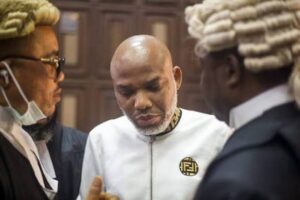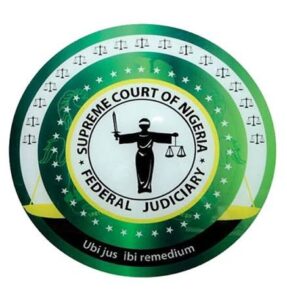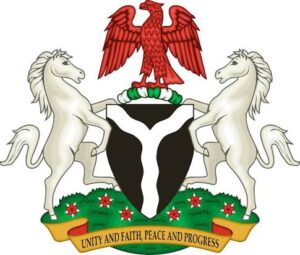
Nigeria has crossed a historic line. The Federal High Court in Abuja has convicted Nnamdi Kanu, leader of the proscribed Indigenous People of Biafra (IPOB), on all seven terrorism-related counts brought by the Federal Government — a verdict that now places him in the category of offenders eligible for the maximum penalty, including death under Nigeria’s terrorism laws.
In the immediate aftermath of the judgment, prosecutors and sections of the media have gone further, describing Kanu as an “international terrorist” on account of his cross-border broadcasts, fundraising and operations that extended well beyond Nigeria’s borders.

Seven Charges, One Verdict
The conviction covers the full seven-count amended charge the Federal Government filed after years of legal battle:
Terror Threats & Sit-at-Home Orders: Kanu’s broadcasts ordering weekly sit-at-home in the South East and warning that anyone who disobeyed should “write his will”, which the Court found amounted to acts of terrorism that paralysed economic and social life in the region.
Incitement to Kill Security Personnel: Repeated on-air directives urging followers to hunt down and attack Nigerian security officers and their family members, held to be terrorism under section 1(2)(h) of the Terrorism Prevention (Amendment) Act 2013.

Direction to Manufacture Bombs: Instructions to IPOB members to manufacture explosives, which the court accepted as clear terror-related preparation.
Importation of Radio Transmitter: Importing and concealing a Tram 50L high-power transmitter in a container falsely declared as used household items, then deploying it as the backbone of Radio Biafra to spread violent propaganda.
Use of Broadcasts as Terror Tool: A pattern of incendiary broadcasts between 2015 and 2021, which the Court ruled were not mere political speech but formed the operational platform for coordinating violence and intimidation across Nigeria.

Leadership and Membership of IPOB: His acknowledged leadership of IPOB, a group the Nigerian state has formally proscribed and designated as a terrorist organisation since 2017.
Knowingly Broadcasting Falsehoods Capable of Causing Terror: Spreading inflammatory false claims designed to inflame ethnic hatred and justify attacks, which the court treated as part of the terror architecture rather than harmless rhetoric.
Taken together, Justice James Omotosho held that these actions satisfied the intent and effect of terrorism: to intimidate the population, coerce government, and destabilise the Federal Republic of Nigeria.

From Radio Biafra to the Brink of the Death Penalty
This judgment caps a saga that began with Kanu’s early Radio Biafra broadcasts from the UK, escalated into his 2015 arrest and 2017 bail jump, and peaked after his controversial rendition back to Nigeria in 2021.

Since IPOB’s proscription in 2017, the South East has endured waves of killings, arson, attacks on police stations and enforced Monday sit-at-home orders. Multiple conflict trackers and rights reports link hundreds of deaths and billions of naira in losses to IPOB and allied armed groups enforcing Kanu’s directives.
Under Section 16 of the Terrorism Prevention Act, some of the offences for which Kanu now stands convicted carry death or life imprisonment on conviction. The Federal Government has already moved: in fresh filings, it is explicitly seeking the maximum sentence, arguing that anything less would trivialise the scale of damage.

What Comes Next
The conviction instantly hardens Abuja’s posture towards violent separatism. It sends a blunt message that using hate-laden broadcasts, threats and cross-border propaganda to direct bloodshed will be treated as international terrorism, not activism. At the same time, it raises the stakes dramatically: any move towards the death sentence will invite intense scrutiny from rights groups, foreign governments and the wider Igbo population who, regardless of views on IPOB, will feel the impact of this verdict.
For now, one fact is clear: Nnamdi Kanu has been convicted on all seven terrorism counts. The battle has shifted from guilt to punishment — and to what this historic judgment will mean for Nigeria’s unity, its rule of law, and the future of separatist agitation in the country.

Headlinenews.news will continue to follow this developing story as the Court moves to the critical sentencing phase.
Headlinenews.news Special Investigative Report.




